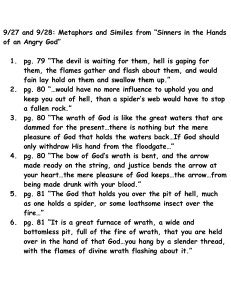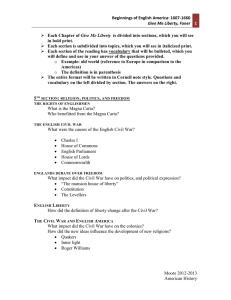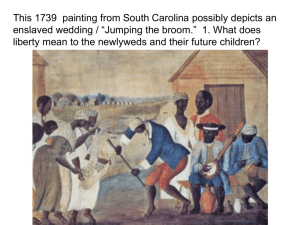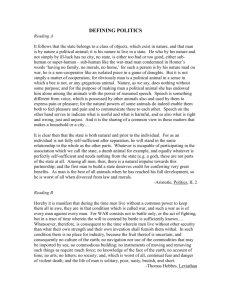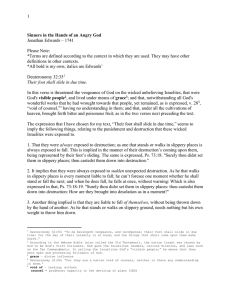Period 2: Three Worlds Meet Unit 1 Document Packet 1. “On Liberty
advertisement
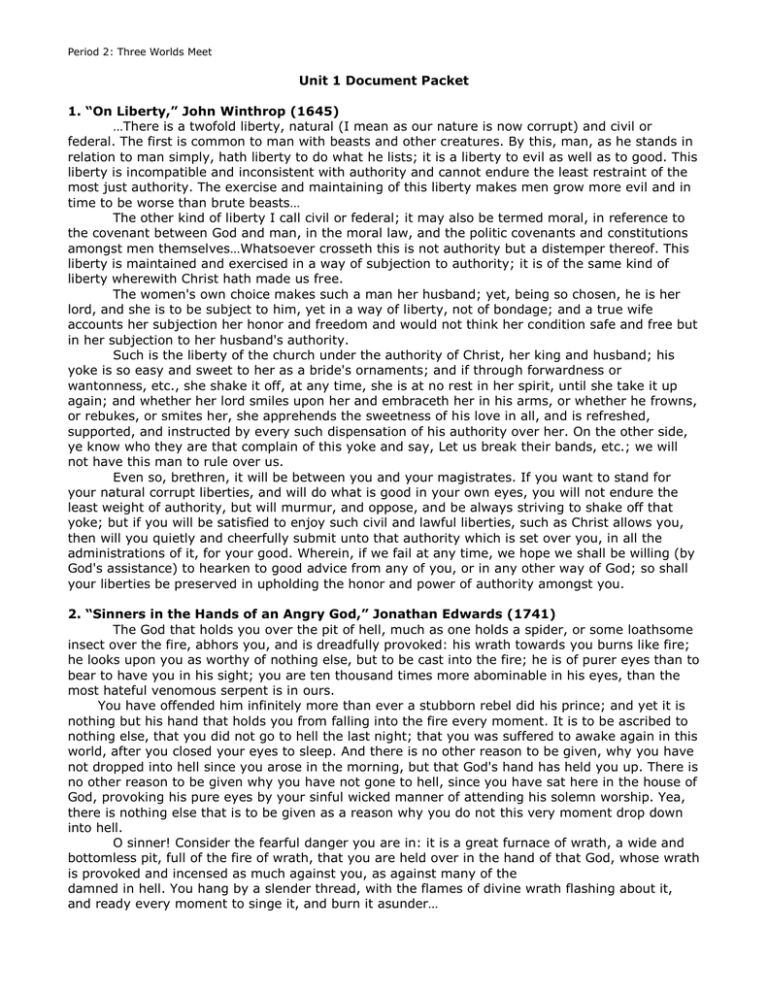
Period 2: Three Worlds Meet Unit 1 Document Packet 1. “On Liberty,” John Winthrop (1645) …There is a twofold liberty, natural (I mean as our nature is now corrupt) and civil or federal. The first is common to man with beasts and other creatures. By this, man, as he stands in relation to man simply, hath liberty to do what he lists; it is a liberty to evil as well as to good. This liberty is incompatible and inconsistent with authority and cannot endure the least restraint of the most just authority. The exercise and maintaining of this liberty makes men grow more evil and in time to be worse than brute beasts… The other kind of liberty I call civil or federal; it may also be termed moral, in reference to the covenant between God and man, in the moral law, and the politic covenants and constitutions amongst men themselves…Whatsoever crosseth this is not authority but a distemper thereof. This liberty is maintained and exercised in a way of subjection to authority; it is of the same kind of liberty wherewith Christ hath made us free. The women's own choice makes such a man her husband; yet, being so chosen, he is her lord, and she is to be subject to him, yet in a way of liberty, not of bondage; and a true wife accounts her subjection her honor and freedom and would not think her condition safe and free but in her subjection to her husband's authority. Such is the liberty of the church under the authority of Christ, her king and husband; his yoke is so easy and sweet to her as a bride's ornaments; and if through forwardness or wantonness, etc., she shake it off, at any time, she is at no rest in her spirit, until she take it up again; and whether her lord smiles upon her and embraceth her in his arms, or whether he frowns, or rebukes, or smites her, she apprehends the sweetness of his love in all, and is refreshed, supported, and instructed by every such dispensation of his authority over her. On the other side, ye know who they are that complain of this yoke and say, Let us break their bands, etc.; we will not have this man to rule over us. Even so, brethren, it will be between you and your magistrates. If you want to stand for your natural corrupt liberties, and will do what is good in your own eyes, you will not endure the least weight of authority, but will murmur, and oppose, and be always striving to shake off that yoke; but if you will be satisfied to enjoy such civil and lawful liberties, such as Christ allows you, then will you quietly and cheerfully submit unto that authority which is set over you, in all the administrations of it, for your good. Wherein, if we fail at any time, we hope we shall be willing (by God's assistance) to hearken to good advice from any of you, or in any other way of God; so shall your liberties be preserved in upholding the honor and power of authority amongst you. 2. “Sinners in the Hands of an Angry God,” Jonathan Edwards (1741) The God that holds you over the pit of hell, much as one holds a spider, or some loathsome insect over the fire, abhors you, and is dreadfully provoked: his wrath towards you burns like fire; he looks upon you as worthy of nothing else, but to be cast into the fire; he is of purer eyes than to bear to have you in his sight; you are ten thousand times more abominable in his eyes, than the most hateful venomous serpent is in ours. You have offended him infinitely more than ever a stubborn rebel did his prince; and yet it is nothing but his hand that holds you from falling into the fire every moment. It is to be ascribed to nothing else, that you did not go to hell the last night; that you was suffered to awake again in this world, after you closed your eyes to sleep. And there is no other reason to be given, why you have not dropped into hell since you arose in the morning, but that God's hand has held you up. There is no other reason to be given why you have not gone to hell, since you have sat here in the house of God, provoking his pure eyes by your sinful wicked manner of attending his solemn worship. Yea, there is nothing else that is to be given as a reason why you do not this very moment drop down into hell. O sinner! Consider the fearful danger you are in: it is a great furnace of wrath, a wide and bottomless pit, full of the fire of wrath, that you are held over in the hand of that God, whose wrath is provoked and incensed as much against you, as against many of the damned in hell. You hang by a slender thread, with the flames of divine wrath flashing about it, and ready every moment to singe it, and burn it asunder… Period 2: Three Worlds Meet It would be dreadful to suffer this fierceness and wrath of Almighty God one moment; but you must suffer it to all eternity. There will be no end to this exquisite horrible misery. When you look forward, you shall see a long for ever, a boundless duration before you, which will swallow up your thoughts, and amaze your soul; and you will absolutely despair of ever having any deliverance, any end, any mitigation, any rest at all. You will know certainly that you must wear out long ages, millions of millions of ages, in wrestling and conflicting with this almighty merciless vengeance; and then when you have so done, when so many ages have actually been spent by you in this manner, you will know that all is but a point to what remains. So that your punishment will indeed be infinite. Oh, who can express what the state of a soul in such circumstances is! All that we can possibly say about it, gives but a very feeble, faint representation of it; it is inexpressible and inconceivable: For "who knows the power of God's anger?" How dreadful is the state of those that are daily and hourly in the danger of this great wrath and infinite misery! But this is the dismal case of every soul in this congregation that has not been born again, however moral and strict, sober and religious, they may otherwise be. Oh that you would consider it, whether you be young or old! There is reason to think, that there are many in this congregation now hearing this discourse, that will actually be the subjects of this very misery to all eternity. We know not who they are, or in what seats they sit, or what thoughts they now have. It may be they are now at ease, and hear all these things without much disturbance, and are now flattering themselves that they are not the persons, promising themselves that they shall escape. If we knew that there was one person, and but one, in the whole congregation, that was to be the subject of this misery, what an awful thing would it be to think of! If we knew who it was, what an awful sight would it be to see such a person! How might all the rest of the congregation lift up a lamentable and bitter cry over him! But, alas! instead of one, how many is it likely will remember this discourse in hell? And it would be a wonder, if some that are now present should not be in hell in a very short time, even before this year is out. And it would be no wonder if some persons, that now sit here, in some seats of this meeting-house, in health, quiet and secure, should be there before tomorrow morning.

